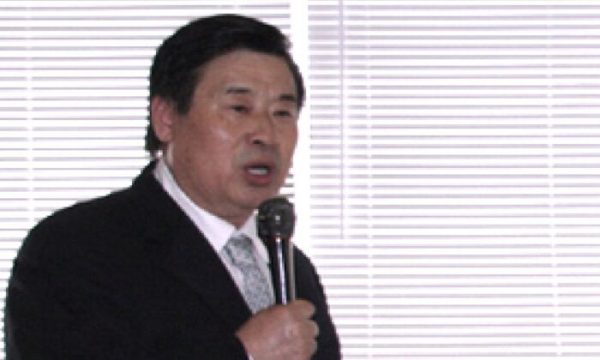A prominent Chinese academic, author and democracy activist living in exile in the U.S. has been accused of living a double life and spying for Communist China.
Wang Shujun, 73, is a U.S citizen residing in Queens, New York, and was indicted alongside four intelligence officers from China’s Ministry of State Security (MSS). The other four men — identified as He Feng, aka Boss He, Ji Jie of Qingdao, Li Ming, also known as Elder Tang or Little Li, and Lu Keqing, also known as Boss Lu — currently remain at large.
The U.S. Attorney’s Office in Brooklyn unsealed an indictment on May 18 against Wang, who was first arrested on March 16 after several criminal complaints against him were received by the Department of Justice (DOJ).
Wang will now face charges of conspiracy and other crimes related to “an espionage and transnational repression scheme in the U.S. and abroad,” a statement released on the DOJ’s website reads.
RELATED READING:
- Chinese Secret Police Plot to Target and Smear US Army Vet Unveiled: DOJ Reports
- DOJ Terminates ‘China Initiative’ Targeting Beijing’s Economic Espionage
- Chinese Spy Caught and Convicted for Plotting to Steal US Aviation Trade Secrets
- China Announces Expansion of Notorious ‘SkyNet’ Program to Surveil and Repatriate Chinese Citizens
“As alleged, Wang participated in a pro-democracy organization with the insidious intent to spy on those who joined these groups. He targeted dissidents living in the United States, putting their lives at risk,” U.S. Attorney Breon Peace said.

Infiltration of exile groups via China’s state security
Success
You are now signed up for our newsletter
Success
Check your email to complete sign up
Prosecutors claim Wang helped start a pro-democracy group in Queens and spearheaded multiple events that enabled him to spy on other dissidents, such as pro-Hong Kong supporters, activists promoting Taiwan’s independence, as well as members of the Uyghur Muslim and Tibetan minority groups.
In 2020, for instance, an ethnic Tibetan officer of the New York Police Department (NYPD), Baimadajie Angwang, was found to be allegedly spying for the Chinese Communist Party (CCP). Angwang, who had also served in the U.S. Army, was described by the FBI as “the definition of an insider threat” who abused his position to further the Chinese regime’s subversion.
According to Attorney Peace, Wang Shujun was well known and respected as an elder in his community’s pro-democracy movements against the CCP.
But in reality, he was acting as a mole within that movement and “spying on and reporting sensitive information on prominent pro-democracy activists and organizations to his co-defendants, who are members of the Chinese government’s Ministry of State Security.”
Peace said the operation had been threatening the safety and freedom of Chinese nationals in the U.S., targeting them for their pro-democracy beliefs, and violating their right to free speech and exercise.
According to the indictment, Wang was likely a genuine dissident who “turned” in 2011, after which he started to work undercover by covertly gathering intel for the Chinese regime. During his communications, Wang would write to He, Ji, Li and Lu using encrypted messaging apps and emails, and also made several trips to China, where he allegedly met with high-ranking CCP officers.
Wang recorded details of his conversations with activists in around 163 draft email entries in accounts that were also being accessed by the state security police, the DOJ said.
In addition, Wang is also accused of transferring telephone numbers and contact information belonging to Chinese dissidents to his handlers, as well as making materially false statements to federal law enforcement about such contacts. Wang also falsely denied that he had contacts with People’s Republic of China (PRC) officials or the MSS.
It is not known why Wang began to work for the CCP.
Olsen: ‘We will not tolerate repressive measures within [the U.S.]’
After Wang was arrested, Zeng Jianyuan, another human rights activist who knew of Wang, expressed his shock and disappointment. “This was an attack by the enemy within,” Zeng said. “He was at the heart of this circle, and could get intelligence first hand, which is why the CCP turned him.”
“Wang Shujun was very active in those circles. I had no contact with him, but I know him,” Zeng told reporters at Radio Free Asia (RFA). “Many of us do. Nobody had fears or suspicions … I wasn’t wary of him.”
Following Wang’s indictment, Assistant Attorney General Matthew G. Olsen said, “We will not tolerate efforts by the PRC or any authoritarian government to export repressive measures to our country,” and condemned the Chinese regime for “suppressing dissenting voices within the United States and to prevent our residents from exercising their lawful rights.”
Wang’s indictment also comes as U.S. intelligence agencies have increasingly warned corporations about the threats they face from PRC spies. The CCP has long been accused of stealing critical trade secrets and patented technology in areas such as quantum computing and artificial intelligence from American companies.















